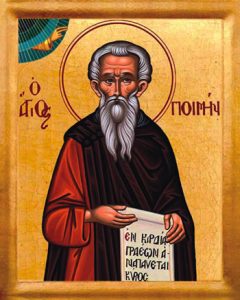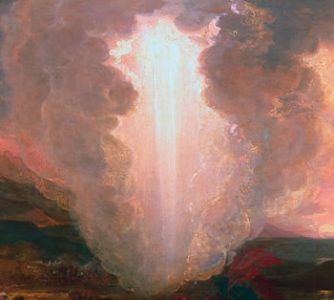A School for Prayer (7)
The Way of the Desert (1)
The Four Imperatives
By Fr Craig Larkin sm, 1943 - 2015
The Abbas and prayer
Coptic Icon, Abba Macarius the Great
The monks went into the Desert in order to find God, to fight the demons and to pray. But the Abbas were very reticent and discrete about their own inner life. There are very few sayings from the Abbas about prayer and praying, and they did not develop a theory or a theology of prayer.
If they said anything, it was simply that prayer should be short, sincere, real, and directed to God in the name of Jesus. The young disciple’s main concern when he got into the Desert and found himself alone was “What does he DO?”
Many of the sayings of the Desert Fathers begin with a question from the disciple: “What do I do, Father?” The disciple had questions like:
How do I fast?
What do I do about my possessions?
What do I do in order to live in peace with my brothers?
What do I do if (or when) I lose my nerve in the desert and want to return home?
What do I do about the thoughts that race round in my mind?
What do I about my temptations?
What do I do when I fall into sin?
How should I guard my heart?
What is interior peace, and what use is it?
Abba Macarius was asked, “How should one pray?” The old man said, “There is no need at all to make long discourses; it is enough to stretch out one’s hands and say, ‘Lord, as you will, and as you know, have mercy.’ And if the conflict grows fiercer say, ‘Lord, help!’ He knows very well what we need and he shows us his mercy.”
Mechanics of the human heart
The great Abbas developed deep insight into the workings of the human heart. They knew how to take the human psyche apart, fix it, and put it back together. They did not propose theoretical systems. Their teaching was usually shaped in a short phrase or a dramatic action. The phrase or action was supposed to be reflected on. It contained the theory.

St Poemen the Great
Many of the simple monks were unable to comprehend complicated systems, but by obeying their Abba, they found answers to their questions. The phrases and actions were remembered and passed on to others; and later, in the time of Poemen, (c. 450) they were written down.
Abba Nilus said, “Everything you do in revenge against a brother who has harmed you will come back to your mind at the time of prayer.”
Abba Pambo asked Abba Antony, “What should I do?” The old man said to him, “Don’t trust in your own virtuousness; don’t worry about a thing once it is done; control your tongue and your belly.”
The Four Imperatives of the Desert Fathers
Four pieces of advice were frequently contained in the sayings and stories of the Fathers: four ‘imperatives’ that each monk needed to obey “in order to be saved.”
1. “Stay in your cell!”
A young monk, full of enthusiasm and the desire to conquer the demons and live for God, soon suffers a shock. He is left with himself in the wilderness.

Benjamin West, detail, Joshua passing the River Jordan with the Ark of the Covenant, 1800,
Art Gallery of New South Wales
He finds himself alone with his thoughts, his memories, his imaginings, his fantasies, his fears and his angers. He begins to lose his nerve. He looks for a means of escape.
So, the first command of the Abba to a disciple is: “Stay in your cell!”
“A brother came to Scetis to visit Abba Moses and asked him for a word. The old man said to him, “Go, sit in your cell, and your cell will teach you everything.”
“A brother who was weighed down with the temptation to leave the monastery informed his Abba, who said to him, ‘Go, and sit in your cell and give your body in pledge to the walls of the cell, and do not come out of it. Let your imagination think what it likes, only do not let your body leave the cell.’ ”
“A brother asked Abba Pastor: ‘What shall I do? I lose my nerve when I am sitting alone at prayer in my cell!’ The old man said to him: ‘Despise no one, condemn no one, rebuke no one; and God will give you peace and your meditation will be undisturbed. But stay in your cell!’ ”
The wise Abbas knew that the first battle a monk must wage is the temptation to escape from himself. Even doing works of charity can be an escape from the harder task of looking closely into one’s inner self.
“Staying in one’s cell” was the first step to self-knowledge.
But it was a battle.
An Abba said, ‘The monk’s cell is that furnace of Babylon where the three young men found the Son of God. But it is also the pillar of cloud, out of which God spoke to Moses.’
The monk learned that he would never live at peace with his brothers, and will never live alone with God, until he has learned to live with himself.
2. “Watch yourself!”
The second great Imperative of the desert is beautifully portrayed in one of the Stories of the Desert Fathers:
Abba Ammonas came one day to eat in a place where there was a monk of evil reputation. Now it happened that a woman came and entered the cell of the brother of evil reputation. The other brothers in that place, having learnt this, were troubled and gathered together to chase the brother from his cell. Knowing that Abba Ammonas was in the place, they asked him to join them. When the brother in question learnt this, he hid the woman in a large cask. The crowd of monks came to the place. Now Abba Ammonas saw the position clearly, but for the sake of God he kept the secret; he entered, seated himself on the cask, and commanded the cell to be searched. Then when the monks had searched everywhere without finding the woman, Abba Ammonas said, “What is this? May God forgive you for judging your brother!” After praying, he made everyone go out, then taking the brother by the hand he said, “Brother, watch yourself!” With these words, he withdrew.
The desert monks realised that a person’s outward behaviours and ways of acting are the product of what is going on inside.
Ammonas, who “saw the situation clearly,” did not need to reprimand the erring monk. He needed only to encourage the monk gently (“he took him by the hand”) to lead him to ask himself: “What has happened to my first intentions?” And “In what direction are my choices leading me?”
To “watch yourself” is to take an honest, searching look at your inner self to see what are the driving forces behind your actions. To “watch yourself” means to ask the hard questions about your behaviours and your desires, and to check out your motives for acting.
The greatest gift a monk could have was to have this sort of insight. Insight came about when a monk could see himself honestly, without self-deception, self-delusion, or self-justification. The way to this gift of insight was to “watch yourself!”
The way to “watch yourself” was to “stay in your cell.”
3. “Be attentive!”

St John Climacus, The Least of These
The Desert Fathers said that three things destroyed the spiritual life:
• Not knowing God
(Ignorance of God)
• Not remembering God
(Forgetfulness of God)
• Having no spiritual energy
(Laziness)
These three things combined to create a state of “spiritual drowsiness.”
This state of spiritual drowsiness is the state in which a person just sails through life without being aware of God, or of others, or of life’s events.
A modern poet calls it the state of “living and partly living.”
St Augustine described it well when he wrote of his efforts at conversion:
I was like a man who begins to wake up but doesn’t want to emerge from sleep; he wants to wake, but he is still overpowered with drowsiness, and falls back into sleep. I heard your words, “Awake, you who sleep, and rise from death and Christ shall give you light.” I believed these words to be true, but I could only reply in my drawling and drowsy words, “Presently, yes, presently; but leave me alone for a little while.” But “presently, presently” had no present; and my “leave me alone for a little while” went on for a long while (Confessions, Book 8).
The opposite of this state is attentiveness and spiritual alertness, for which the Fathers used the word prosochē.
Think of how a young mother with a baby can be in a crowded room with many people talking, yet she can detect the cry of her baby who is in another room. That is ‘attentiveness.’
Think of a young man in love, who can detect the sound of his girlfriend’s voice, or even the scent of her perfume, in a crowded room. That is ‘attentiveness’ (prosochē).
The same attitude of attentiveness to the presence of God is what the Desert Fathers called prosochē.
The monks were aware of how important this state of attentiveness was in order to keep the spiritual life fresh, and they worked hard to keep alive an attitude of attentiveness, alertness, awareness of God’s presence.
They were aware of the need to ‘guard the heart,’ and to be aware of/attentive to what is happening in the ‘engine-room’ of our lives.
4. “Do not judge!”
The Desert Fathers took seriously the Gospel command not to judge or condemn others, and they went to great lengths to avoid judging others.
Be careful not to judge someone
before God has done so (Isaac of Thebes).
Do not make judgements, and you will travel no quicker road to the forgiveness of your sins. ‘Judge not, so that you may not be judged’’ (Luke 6:37)
(John Climacus, Ladder Step 10).
If you are temperate, do not judge the fornicator, for you would then transgress the law just as much. For he who said, ‘Do not commit fornication’, also said, ‘Do not judge’ (Abba Theodore).
If a bird abandons the eggs she has been sitting on, she prevents them from hatching. In the same way, a monk or a nun will grow cold and their faith will perish if they go wandering from place to place
(Amma Synclectica).
The Four Imperatives in a modern context
 The wisdom of these Desert Fathers was not only a wisdom for the age of the Desert.
The wisdom of these Desert Fathers was not only a wisdom for the age of the Desert.
It is equally valid for our lives today.
1. “Stay in your cell!”
What does that mean today?
a) Avoid compulsive activity
Even doing charitable works can be a way of avoiding the moment of facing oneself. And we all know people who give themselves to people in their apostolate but cannot live with the members of their community.
b) Avoid compulsive passivity
The other extreme - going from doing too much to doing nothing - is also dangerous; it creates interior emptiness rather than interior silence.
c) Notice how, when, and why, you use your mobile phone, internet, and TV
Mobile phones are not designed to create interior silence, but in fact to remove or fill up interior silence. Interior silence is necessary for developing interior peace. Interior peace creates inner freedom.
The internet provides useful information. It also breeds curiosity; curiosity feeds addiction; addiction removes inner freedom.
When watching TV, take note of your ‘body language,’ how you sit, how you use the channel-button. Mindless watching of TV does nothing to create inner silence.
d) Build into your daily life some time for solitude and silence
Two questions that may reveal some honest truths:
“What happens to me when I am alone?” “What causes me to be bored, and what do I do when I am bored?”
2. What things will help me to watch myself?
Be prepared to notice your behaviours, and be prepared to gain insight into your behaviours by:
• Examination of consciousness
• Spiritual Direction
• Personal and pastoral accompaniment or supervision
• Listening carefully to unasked-for criticism without instantly justifying yourself
• Psychological evaluations
• Shifting a focus from reflecting on how other people’s actions affect me, to how my actions might affect others
Mother Teresa of Calcutta suggests that at our evening examen of consciousness we simply:
• Look at our hands and ask what we have done with them today
• Look at our feet and ask where our feet took us during the day
Note
Being out of one’s culture, or being culturally displaced is not comfortable, but it is a good way to be aware of what is happening in our inner life. Watch especially thoughts of anger, thoughts of sadness, sexual fantasies.
“If the inner man is not vigilant, it is not possible to guard the outer man.”
An elder of the Desert
3. What tools will help me to be attentive?
• Begin, continue and end each day saying: “I will hear what the Lord God has to say.” (Psalm 84:9)
• Develop the habit of pondering the mysteries of God in the Scriptures.
• Develop an ascetical and disciplined life.
• Don’t give up.
Abba Poemen said:
A monk’s troubles begin when he stops being attentive. The beginning of evil is heedlessness.
4. And what about ‘Don’t judge?’
As relevant as it ever was!
Abba Paphnutius said, Do no evil to anyone, and do not judge anyone. Observe this and you will be saved.
 Entries(RSS)
Entries(RSS)